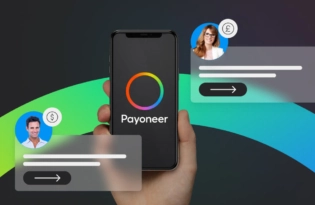HomeResourcesOnline BankingOnline Banking
Open a business bank account in the U.K: Expand your business to the U.K.
Expanding your business to the UK? You’ll need a UK bank account to do so. Pay suppliers via cheque or wire transfer, and easily get paid by your UK customers.

Having a UK business account gives you easy access to one of the biggest free market economies in the world.
If you want to expand your trade and open a business bank account in the UK, you are in the right place. Below, you will find everything you need to know about opening business accounts around the United Kingdom.
You will also discover a few alternatives, like Payoneer, that may work better for your specific business than traditional business bank accounts.
Types of business bank accounts in the U.K.
There are several types of bank accounts in the UK Each allows you to perform different kinds of transactions. Understanding what these accounts offer will help you select the option that best meets your specific financial needs.
Current account
Current accounts are the most popular accounts in the UK. You can open a current business bank account in the UK and use it to fulfill daily banking needs, such as:
- Cash deposits and withdrawals
- Receiving different types of payments, like salaries
- Setting up direct debits to make recurring payments, like paying bills, easier.
Most current accounts are free to open and maintain, but others may have a nominal monthly cost. There are also options for premium accounts that come with additional benefits (with a monthly fee).
An example of a premium account is a packaged account, which can cost around £10 to £15 per month. Packaged premium accounts offer benefits for businesses, such as travel insurance, ID fraud insurance to protect your account, interest-free or discounted overdraft when you need it.
Basic account
Basic accounts have features for essential everyday banking services only. They limits you to various direct debit payment options and debit cards.
You cannot access credit cards or loans with this type of account. Basic accounts are free to open and maintain. They are suitable for individuals with poor credit or those struggling to open current accounts.
If you’re a freelancer or sole trader, you can use your basic account for business purposes, although it’s not advisable. It’s always best to keep your personal and business expenses separate. Alternatively, you can start with a basic, then upgrade to a checking account, later.
Savings account
As the name indicates, savings accounts are for saving, not regular daily use, as with a checking account. You simply deposit money you want to put aside for savings into the account, and earn interest from it.
The amount you get back in interest depends on the interest rates offered by your bank and the amount of money you have deposited. The higher the interest rates and deposit amount, the more money you can earn.
There are several different savings accounts available, such as notice savings accounts, easy-access savings, and fixed-rate bonds.
International/Non-residential account
Most major banks in the UK allow you to open and operate current accounts from overseas (more information about this is below).
Digital account
Almost all UK banks have adopted modern fintech solutions to provide their services online – via official bank websites and mobile banking applications. This means that you can open and run your account remotely. The UK is also home to several banks that are digital-only, meaning they do not have a physical branch location, all transactions are done online or via a mobile app.
Offshore account
Most mainstream banks in the UK offer offshore banking services which allow you to open checking accounts overseas. These accounts operate in a similar way to standard checking accounts. However, they are more flexible and typically have higher interest rates than standard checking accounts. You can also potentially benefit from the low tax rates associated with offshore accounts.
How do business accounts work in the UK?
Business accounts help separate your business and personal finances, making it easier to track your profits and business expenditures and to comply with tax laws, without putting your personal finances at risk.
The main differences between business and personal accounts can be found in :
- The rates and prices
- The limitations for creating an account
- The time it takes to open an account
Rates and prices
Business accounts may charge higher fees and have fees associated with certain transactions that are typically free for personal users. For instance, you could pay a small fee for the amount of monthly money transfers you make.
Other fees may include:
Monthly fees
Also commonly referred to as a service fee, some banks charge a monthly fee for maininting your account. Some banks waive these fees if you can maintain a specific minimum account balance.
ATM fees
Nearly 95% of ATM withdrawals, using your debit card, are free of charge in the UK However, some prepaid cards do incur a fee at ATMs.
International transaction fees
UK banks charge approximately 3% for almost all foreign transactions. These may include international withdrawals or making purchases abroad. Some banks apply a flat fee of approximately £1 to £3 for every transaction.
The common name for these fees is a non-sterling transaction fee or load fee.
Account closure fees
You may have to pay early closure fees if you close your account too soon after opening it, with some UK bank accounts.
Annual card fees
A few banks, especially those which offer exclusive cashback or rewards, charge an annual fee. The amount varies and can be approximately £100 to £250.
Poor foreign exhange rates when transferring money
Trading rates of the pound against the dollar fluctuate daily. You may incur high fees when transferring money because of poor foreign exchange rates.
Some of the hidden fees for international transfers may include:
- One-off request fees
- Same-day transfer fees
- Card replacement fees
- Overdraft fees
- Bank notary fees
- Incorrect information fees
- Minimum balance requirement penalties and minimum deposit rates
It’s advisable to check all the costs a bank charges before you open a business bank account in UK You may also want to consider the following:
- The range of features and services a provider offers. These features may include borrowing options and investment opportunities.
- Flexibility and ease of use. You want to operate your business in the UK with ease. An online bank account may be the best option so that you have access 24/7.
- International scope. Confirm whether the provider offers multi-currency account options that suit your business.
- Customer support. It’s good to make sure there is an easily-accesible support line with various modes of contact, in case of any issue with your banking.
Limitations of opening a business bank account
By law, UK banks must perform Know Your Customer (KYC) and Anti-Money Laundering (AML) checks before opening a business bank account for you.
For this reason, most banks have additional requirements beyond those needed to open a standard personal account. You should check what these requirements are before applying, to simplify and speed up the process.
Time to open a bank account
Overall, opening business accounts takes longer than opening personal ones. It could be a few hours, days, weeks, or months, depending on the institution you want to partner with and your specific financial circumstances.
Essentials for opening a business bank account in the UK
The UK’s business regulations and entrepreneurial culture favor small and medium-sized businesses . There is government support for local and international businesses to invest in the region and thrive. This is why SMBs account for nearly 99.9% of the UK’s business population.
A few essential documents or details are necessary to open a UK bank account, including:
Proof of identification
You can use any of the following government-issued national identification documents to prove your identity:
- Identification photo card (I.D.)
- Valid passport
- Driving license
You also have to provide the usual contact details – your personal and business phone numbers, as well as email addresses.
Proof of UK address
Different banks accept various documents as evidence of your personal and business address in the U.K, including:
- Recent utility bills (less than six months old)
- Bank or credit card statement (less than three months old)
- UK mortgage statement (less than a year old)
- Current council tax bill (less than a year old)
Business verification documents
You will need business verification documents if you operate a Limited Liability Company (LLC) or Limited Liability Partnership (LLP). These documents may include:
- Your estimated annual turnover
- The total number of your employees
- Companies House registration number or a valid certificate of incorporation
- Business plan (in some cases)
- Details of company directors who own over 10% of the business
- Your business’s tax information. This includes your national insurance number or Unique Taxpayer Reference (UTR*).
*A UTR is a 10-digit unique reference number you receive once you register your company with the Companies House, as is legally required. Your UTR helps you with HM Revenue & Customs (HMRC) correspondence
Expectation of opening a UK bank account
If you want to open a business bank account in the UK, there are three corporate entities the country legally accepts:
- Sole traders
- Limited Companies
- Business Partnerships
The specific details of each business structure vary from country to country. For example, an LLP in Scotland works differently from one in England.
If you have all the business documents ready, you will find it a very straightforward verification process to open a UK business account in different regions.
However, there are a few situations where it could potentially be more difficult to open your business account.
Opening an account with bad credit
You can open a business account, even if you have a poor credit history or no credit history at all. There are banks that may want to know about your personal finances before offering their business banking services to you. Most of these banks will hesitate to open a business account for you if you have bad credit.
Other banks may agree, but your access to the account’s features will be limited. A few essential services, like earning interest on your money, may not be available.
Opening an account from overseas
It’s possible to open a UK bank account from the U.S. or other countries, although it may not be so easy. Banks are typically cautious due to potential fraud and money laundering concerns. The situation may be more simple if you’re a UK resident living abroad.
If you’re looking to open a UK bank account from within the United States, you will need to prove that:
- You are the director of a business registered with Companies House in the UK.
- You have a UK residential address
For non-residents living abroad, this process may be more challenging, though still doable.
Opening an account as a non-resident
To open a UK bank account, you will need identification and proof of current address. The bank you choose may offer a range of accounts, but there may be certain restrictions on them.
You can also ask your home bank to help you establish an account in the UK Many large international banks have banking operations in the UK and can help you set up in the region, at a an extra cost.
However, the best alternative for you may be using a traditional banking alternative, like Payoneer.
Payoneer: The best alternative to a bank account
Payoneer is one of the most reliable and affordable UK bank account alternatives.
Your business will have access to over 67 million UK residents without having to worry about unconventional fees for performing international business transactions. You can also skip the hassle of trying to open a UK bank account from the U.S. by registering online within a few minutes.
Payoneer is a payment-service dedicated to businesses only, using the most advanced technologies to provide banking solutions to businesses of all sizes. It will take approximately three business days to get approved so that you can start using the global payment service solution to start making online transactions.
Looking to receive payments like a local? Register for a Payoneer account and enjoy a more flexible, reliable way to get paid globally. You’ll get access to multi-currency accounts so you can get paid in popular currencies like USD, GBP, EUR, and more as if you were a local.
In addition to giving your clients in the UK an easier way to pay, Payoneer allows you to expand and access customers in over 190 countries and territories worldwide.
Comparison: Payoneer vs U.K. bank accounts
| Payoneer | UK Bank Account | |
|---|---|---|
| UK Bank Details Included | ||
| Free Debit Card | ||
| 3D Secure | ||
| Overdraft | (Cost-efficient, no overdraft fees) | (Overdraft fees may apply) |
| Free Multi-Director Access | ||
| Invoicing Included | ||
| Integrated Accounting | (Integrates with Quickbooks) | (No integration) |
| Multi-Currency Accounts | ||
| UK Bank Transfer Fee | (free to other Payoneer account holders) | |
| Currency Transfer Fee | ||
| Int’l Card Transaction Fee | ||
| Deposit Protection | (Partners with FDIC members) | (Protected by FSCS) |
| Customer Service | (In multiple languages) |
Grow your business in the UK today
Knowing how to open online bank accounts in the UK is beneficial for any international business person. When looking at your options, it’s important to understand the benefits and disadvantages of opening a traditional bank account. Avoid the hidden bank fees and access all the essential services your business requires to operate in the UK, faster, with Payoneer. Register and try Payoneer today!
Related resources
Latest articles
-
Made in India for the World: The State of Indian Cross-Border eCommerce
The Indian eCommerce market has grown significantly in the last few years. As a result, many cross-border businesses have undergone a fast-paced digital transformation and contributed to surpassing the government-set $400 billion target of trade within a single year.
-
Defying the odds: How Ukrainian businesses thrive during war
One year post-war, Ukraine’s businesses adapt and thrive amidst adversity. Entrepreneurs showcase resilience, reflecting national tenacity. Many diversify, venturing into e-commerce and digital realms. Despite hurdles, 44% of SMBs aim for growth, with 36% hiring. Their grit underscores Ukraine’s enduring spirit amid challenges.
-
An 8-point Checklist for Finding the Best Payment Provider
There’s huge potential to expand into ASEAN markets. But only for online sellers that accept local payment methods. Finding a trusted payment solution can be a worry and a challenge. Use this checklist to vet potential payment partners. With the right payment support, the sky’s the limit!
-
How to bill your international clients
Want to learn how to bill international clients when you’re based in the Philippines? In this article we spoke to three leading business owners who shared their tips to working successful international work. Learn how they collect payments and more below.
-
How to nail your direct-to-consumer payment strategy
Asia-Pacific offers massive potential for DTC ecommerce. But cross-border payments can be a headache. We share an actionable strategy for DTC payments that’ll remove DTC payment hazards and expand your business with ease. What are you waiting for?
-
How to pay international vendors in order to promote profits and reduce risk
In this article, we’ll share our expert tips and best practices for paying international vendors, so you can focus on growing your business. From choosing the right payment method to navigating currency exchange, we’ve got you covered.













